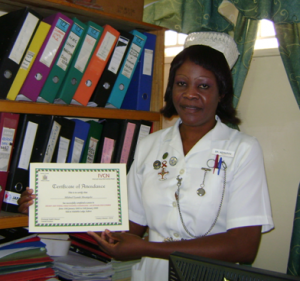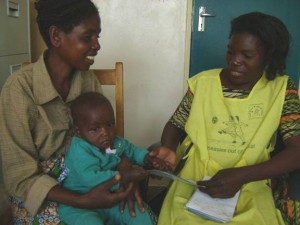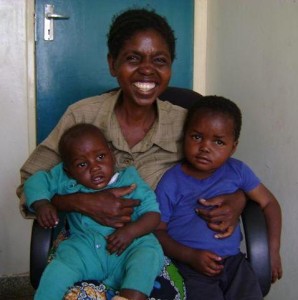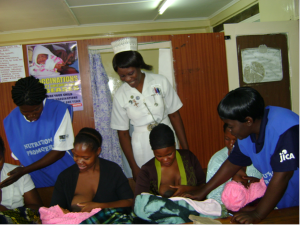When Patricia Nawa was pregnant with her fifth child, she tested positive for HIV. The 37-year-old mother in the urban Zambian township of Kanyama faced a frightening question that so many mothers-to-be in her community must confront every day: How do I protect my baby from the virus?
Patricia didn’t know that the wheels were already in motion to provide her with the information she needed to keep her baby healthy, beginning with a health worker named Victoria Ndhlovu. Nurse Victoria’s knowledge had already helped protect other infants from HIV, and if it reached Patricia soon enough, she too could shield her child from the epidemic.
A harmful choice
As a nurse manager at the bustling Kanyama Health Centre in Lusaka, Victoria has seen how misinformation about HIV prevention can put babies in harm’s way. The virus can be passed from a mother to her child through breastfeeding, yet in many situations, infants who are not fed breast milk suffer infections such as diarrhea and pneumonia and are prone to malnourishment—all life-threatening conditions.

Victoria Ndhlovu, a nurse manager at the Kanyama Health Centre in Lusaka, Zambia, displays her certificate after completing an IYCN training course.
To prevent HIV infection through breastfeeding, health providers in poor countries around the world often incorrectly counsel women like Patricia to stop breastfeeding if their babies test HIV negative at 6 weeks old, the earliest time for detecting HIV infection after delivery. But many families cannot meet the requirements needed to safely choose replacement feeding for their infants. The cost of formula can be prohibitively expensive, and countless families do not have access to the clean water or sanitary conditions they need to prepare formula without making their infants sick. Without realizing it, they may be endangering their babies by feeding them formula to avoid HIV.
Victoria and her health center colleagues had seen numerous babies facing possible irreversible damage caused by severe malnutrition. Their mothers, following inaccurate advice, had switched to replacement feeding, but their children became seriously ill from infections and malnutrition.
“We all felt hopeless and sad,” said Victoria. “We weren’t sure how to keep this from happening to more babies.”
View an interview with Nurse Victoria. She talks about how volunteers are supporting mothers to improve infant and young child feeding in the Kanyama community. [Posted December 2010]
Understanding risks
In November 2008, Victoria found her answer at a six-day workshop led by the Infant & Young Child Nutrition (IYCN) Project. The IYCN Project supports the Ministry of Health in training health care workers and community volunteers in Zambia about infant feeding. These workers and volunteers counsel new mothers about good feeding practices to ensure that HIV-positive women receive the best information to protect their babies’ health.
Victoria knew that exclusive breastfeeding—breastfeeding without adding any other foods or fluids to a baby’s diet—is best for babies during their first six months of life. But like many other health providers at the workshop, she did not realize that replacement feeding increases an infant’s risk of death from common diseases. She also learned that giving other foods or fluids to breastfed infants younger than 6 months increases the risk of HIV infection compared to babies who are exclusively breastfed. According to World Health Organization guidelines, HIV-positive mothers should avoid breastfeeding only when replacement feeding is acceptable, feasible, affordable, sustainable, and safe.
Spreading the word, improving knowledge
After the training, Victoria was determined to prevent more babies from suffering. Working quickly, she pulled together 70 community volunteers from Kanyama Health Centre for a two-day orientation based on what she had learned at the IYCN workshop. She wanted to be sure the health center was well equipped to support mothers on good infant feeding practices. Health workers often don’t have time to counsel mothers, so volunteers fill that key role.
The participants gained critical knowledge about infant feeding and were able to sort through the mixed advice they had been giving to new mothers. Before the training, some volunteers confessed that they were not confident in how to best counsel HIV-positive mothers about feeding their infants. After the course, they were ready to offer mothers correct, consistent information.
Help for Patricia

Patricia Nawa, with baby Nawa, receives infant feeding support from a community volunteer at the Kanyama Health Centre in Zambia.
Patricia Nawa is one of these mothers. When Patricia tested positive for HIV with her child still in the womb, a trained community volunteer advised her on her best options for feeding her baby and protecting the infant from HIV. Heeding this advice, Patricia began exclusive breastfeeding when she gave birth to a healthy boy. And when the infant tested negative for HIV at 6 weeks old, Patricia continued to breastfeed exclusively.
When her baby, Nawa, reached 6 months of age, replacement feeding was still not acceptable, feasible, affordable, sustainable, and safe, so Patricia continued to breastfeed him as she introduced complementary foods. Now, nine months after baby Nawa’s birth, Patricia is transitioning her son to other milks—and watching him grow into a robust little boy, free, so far, from HIV.
“I am happy that I came for counseling,” she says. “I am confident that my child is growing well.”
It’s the kind of story Nurse Victoria is pleased to see, and one of many that Kanyama health staff can now proudly share. Victoria will continue to train health workers and volunteers to deliver accurate and consistent messages to mothers. Together, they are improving infant feeding support for Patricia and her baby, and for families throughout Kanyama.
Learn more about IYCN activities in Zambia.
Date: Aug 8, 2009 | Category: Success stories


